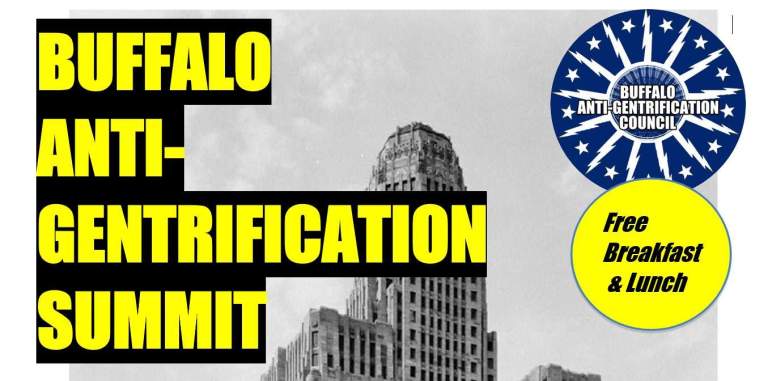
Ecological Justice, Justice & Opportunity
People Power: Joining Forces to Address Gentrification in Buffalo
Published October 18, 2017
“Gentrification is a profit-driven race and class remake of urban, working class communities of color that have suffered from a history of disinvestment and abandonment,” said Dawn Philips, Executive Director of Right to the City Alliance at the Anti-Gentrification Summit convened in Buffalo on October 14, 2017. Philips underscored an important focus of the gathering: people power. “If we are going to have any chance whatsoever of pushing back on big banks, on corporate landlords, and international developers, we have to join forces… not only in our region, but across the country.”
The summit stressed the interconnectedness of several problems in Buffalo, including police violence, the school to prison pipeline, lack of community control over resources, and racism. The unifying factor amplifying and allowing these problems? Gentrification. “It might look particular and unique in cities like Buffalo, like Oakland, like Minneapolis, the specific ways in which this plays out. But those twin processes, on the one hand long-term disinvestment followed by hyper-investment, are key features of what we call the gentrification process,” said Philips.
India Walton of Open Buffalo led a sharp analysis of policing and gentrification in Buffalo, highlighting the changed nature of policing alongside the current re-investment in the Fruit Belt and the nearby medical campus. “Police come into neighborhoods like mine, where our little black boys walk around the streets and play basketball. That used to be ok,” she said. “But since our community has become a place of value, that worldview is shifting. Now we have police approaching our young men and asking them what they’re doing in their own neighborhood.”
Following Dawn Philips’ keynote talk, the all-day summit continued with a Just Transition Framework presented by local leaders John Washington, India Walton, and Kevin Connor. Three rotating workshops were held, on the “School to Prison Pipeline,” led by Citizen Action; “CBAs: How to Get Community Control of Resources,” led by PUSH Buffalo and CEJ Buffalo; and “Gentrification is the New Colonialism” led by Open Buffalo and VOICE Buffalo. Lunch was served with music from DJ Sike and a poem by Open Buffalo Emerging Leader Jillian Hanesworth.
Franchelle Parker, Executive Director of Open Buffalo, chaired the closing panel discussion on the local impact of gentrification and strategies to address it on a city-wide scale, featuring Sam Magavern, Dennice Barr, and Rebecca Rosado. Magavern, Executive Director of Partnership for the Public Good, highlighted the urgency of this particular moment in Buffalo. “We’re at a point in Buffalo where the challenges are huge, where rents are skyrocketing at the very same time that poverty has been getting worse, not better,” he said. “And we’ve got this window of time to prevent Buffalo from really losing its opportunity. We’ve got the resources to do it.”
Looking to the work ahead, John Washington of PUSH Buffalo issued a call to action: “It's gonna take us all organizing another group and another group and another group to build the power we need. So, when we call, when we ask you to come down to City Hall, respond. That's how this works.”
The Anti-Gentrification Summit was co-organized by a broad coalition of community groups, including Open Buffalo, Partnership for the Public Good, Citizen Action, PUSH Buffalo, Coalition for Economic Justice, Voice Buffalo, Public Accountability Initiative, and Right to the City Alliance.